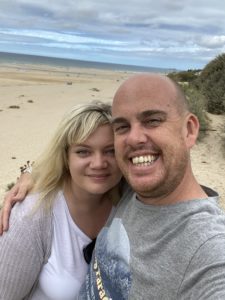Sara’s story – the reality of being a kidney donor
My name is Sara, and I am 36 years old. Originally from the countryside on the Essex/Suffolk border, I now live in Southend-on-Sea with my husband, Chris.
I met Chris 11 years ago after we had been chatting online for months through a mutual friend. He has always been very open and transparent about his health and his kidney journey. So once our relationship developed it did so on an honest foundation and view of what our potential marriage could look like with regards to a transplant.
Once we were informed that Chris’ kidney function was steadily declining, they asked if there was anyone who would be willing to be tested as a potential living donor – with the view the procedure would be pre-emptive to avoid dialysis. Unfortunately, with no suitable immediate family, the only option was to go forward onto the transplant list once he dipped below 15% function.
Chris’ main goal was to always bypass dialysis, but if he had to go on the donor list, it would be highly likely he would have to start treatment. One day I just said, “I’m going to get tested and we’ll go from there.” No negotiation, no “putting it out there”. It just went and put myself forward.
To me, as flippant as it may sound, it was no big deal. I just thought they’ll tell me either way if I can be a potential donor, or we will have to think of another option. Donating my kidney to save my husband’s life, and to give him a better quality of life, just seemed like something you would do for someone you love.
After asking the renal unit if they would consider me, I was put forward for initial compatibility testing. This involved cross-matching our bloods, an ECG and a scan of my kidneys. I went to the renal unit at Southend Hospital and had all my vitals and tests done over the course of a few months.
The work-up process for us has been slow, as Chris’ function has declined steadily over the past few years. I was fortunate enough to pass through all of my testing without any complications. Me and Chris also found out we are also exactly the same blood type, which makes my kidney an even better option for him. Currently, I am awaiting an appointment at The Royal London to meet my surgeon, so everything is starting to feel more real now.
I would love to say that the work-up process has been smooth sailing, but for anyone who is considering being a living donor, I believe it is important to read honest accounts of what may lie ahead. Depending on who you are donating to, in my case my spouse, communication is vital during the whole process.
Me and Chris have had to have challenging, uncomfortable, and at times brutal, conversations about how we are going to navigate through (1) the surgery, and (2) the recovery. You have to be prepared for every scenario, including death.
Death isn’t something anyone wants to think about but unfortunately, everything comes with a risk. We also had to make the choice of whether we start a family naturally (we spent four years trying to conceive to no avail) or give up the idea that I would ever get pregnant.
The renal consultant explained that not only can conceiving after donation increase my risk of high blood pressure, kidney failure, stroke, and death; it can also cause catastrophic implications for the unborn child. We decided to give up on starting a family, and focus on life after transplant for us two.
The magnitude of the donation hit me when I had to write my will and last wishes. I had also read some accounts on a living donor support group that highlighted the potential issues we may face afterwards.
Some of the accounts detailed that they had to have a second surgery due to complications. Another went into graphic detail about how scar tissue had formed under the wound and they were in constant agony. Another one explained how her recipient’s body rejected the kidney. One wished she had never put herself forward at all.
It suddenly dawned on me that things can, and quite possibly will, go wrong. I started asking myself:
- “What if they botch my surgery?”
- “What if they botch Chris’ surgery?”
- “What if his body rejects my kidney?”
- “What if my remaining kidney fails?”
- “What if I die?”
- “What if Chris dies?”
Even though these do weigh on my mind at times, it’s not enough for me to feel that I wouldn’t want to give Chris a kidney. I just focus on how our life will look after recovery, and where we will venture to. Chris has an infectious, positive outlook that keeps us strong. Ultimately, if things don’t go to plan, we will still be in it together – forever and always.

Last Reviewed on 26 June 2024
